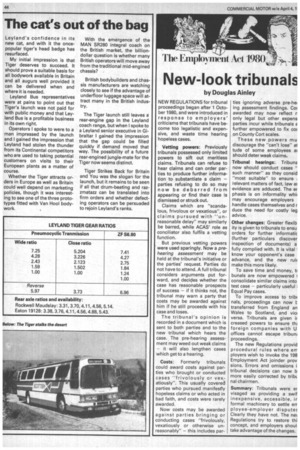New-look tribunals
Page 48

If you've noticed an error in this article please click here to report it so we can fix it.
by Douglas Ainley
NEW REGULATIONS for tribunal proceedings began after 1 October 1980, and were introduced in response to employers' criticisms that tribunals have become too legalistic and expensive, and waste time hearing hopeless cases.
Vetting powers: Previ dusty tribunals possessed only limited powers to sift out meritless claims. Tribunals can refuse to hear claims and can order parties to produce further information to substantiate a claim — parties refusing to do so may now be debarred from appearing or find their case is dismissed or struck out.
Claims which are "scandalous, frivolous or vexatious", or claims pursued with "unreasonable delay" may similarly be barred, while ACAS' role as conciliator also fulfils a vetting function.
But previous vetting powers were used sparingly. Now a prehearing assessment may be held at the tribunal's initiative or the parties' request. Parties do not have to attend. A full tribunal considers arguments put forward, and decides whether the case has reasonable prospects of success — if it thinks not, the tribunal may warn a party that costs may be awarded against him if he still proceeds with his case and loses.
The tribunal's opinion is recorded in a document which is sent to both parties and to the new tribunal which hears the case. The pre-hearing assessment may weed out weak claims it will also lengthen cases which get to a hearing.
Costs: Formerly tribunals could award costs against parties who brought or conducted cases "frivolously or vexatiously". This usually covered parties who pursued manifestly hopeless claims or who acted in bad faith, and costs were rarely awarded.
Now costs may be awarded against parties bringing or conducting cases "frivolously, vexatiously or otherwise unreasonably" — this includes par
ties ignoring adverse pre-hei ing assessment findings. Co: awarded may now reflect r only legal but other expens parties incur while tribunals a further empowered to fix co on County Cort scales.
These new powers mu discourage the "can't lose" al tude of some employees al should deter weak claims.
Tribunal hearings: Tribuna now should conduct cases such manner" as they consid "most suitable" to ensure 'relevant matters of fact, law ar evidence are adduced. The er phasis is on informality whil may encourage employers handle cases themselves and r duce the need for costly leg advice.
Other changes: Greater flexib ity is given to tribunals to ensu orders for further informatic (further particulars discover inspection of documents) a fully complied with. It is vital • know your opponent's case advance, and the new rulf make this more likely.
To save time and money, ti bunals are now empowered I consolidate similar claims into test case --particularly useful i Equal Pay cases.
To improve access to tribt nals, proceedings can now transferred from England an Wales to Scotland, and vie( versa. Tribunals are given ir creased powers to ensure th foreign companies with U offices cannot escape tribuni proceedings.
The new Regulations provid procedural rules where err ployers wish to invoke the 198 Employment Act joinder prov sions. Errors and omissions i tribunal decisions can now b more easily corrected by tribi. nal chairmen.
Summary: Tribunals were er visaged as providing a swif inexpensive, accessible, ir formal machinery to settle err ployee-employer disputes Clearly they have not. The ne■ Regulations try to restore thi concept, and employers shoul take advantage of the changes.












































































































